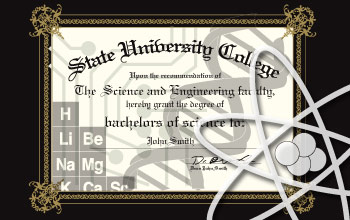|

Press Release 06-117
A Science or Engineering Bachelor's Degree Is Good for You

Degree holders find it valuable in a variety of jobs
August 14, 2006
Earning a bachelor's degree in science or engineering (S&E) appears to serve the recipient well in the workforce, regardless of the job they do. In fact, according to a National Science Foundation (NSF) survey, people who have earned an S&E bachelor's degree generally report that science and engineering knowledge is important to their job.
That holds even if the graduate ends up doing non-technical work. According to the survey, among those workers whose only degree was an S&E bachelor's, 27 percent had S&E occupations. Sixty-three percent working in non-technical fields still said their jobs were related to their S&E degree.
Some 400,000 sales workers, for example, reported their job was related to their S&E bachelor's degree. And a majority of S&E bachelor's degree holders employed as artists, editors or writers reported their degree was at least somewhat related to their job.
Of those who went on to receive advanced degrees, the largest proportion, almost 29 percent, took those degrees in non-S&E fields, namely business, law or medicine.
"S&E knowledge remained important to the jobs of most S&E bachelor's holders with advanced degrees--being reported as necessary by a majority of both those with master's degrees in business and those with other non-S&E advanced degrees," the survey said.
The data are reported in the NSF InfoBrief, What Do People Do After Earning a Science and Engineering Bachelor's Degree?
The report used data from the NSF's 2003 SESTAT survey--a pooled set of large demographic and workforce surveys--and included responses from people who had earned a bachelor's degree in science or engineering at least 10 years earlier.
About half of those who earned an S&E bachelor's earned no additional degree. Only slightly more than 4 percent earned a Ph.D. in the same field as their bachelor's. The remainder earned advanced degrees in a wide variety of fields.
-NSF-

Media Contacts
Leslie Fink, National Science Foundation (703) 292-5395 lfink@nsf.gov
Program Contacts
Mark Regets, National Science Foundation (703) 292-7831 mregets@nsf.gov
Related Websites
InfoBrief: What Do People Do After Earning an S&E Bachelor's Degree?: http://www.nsf.gov/statistics/infbrief/nsf06324/

The National Science Foundation (NSF) is an independent federal agency that supports fundamental research and education across all fields of science and engineering. In fiscal year (FY) 2009, its budget is $9.5 billion, which includes $3.0 billion provided through the American Recovery and Reinvestment Act. NSF funds reach all 50 states through grants to over 1,900 universities and institutions. Each year, NSF receives about 44,400 competitive requests for funding, and makes over 11,500 new funding awards. NSF also awards over $400 million in professional and service contracts yearly.
 Get News Updates by Email Get News Updates by Email
Useful NSF Web Sites:
NSF Home Page: http://www.nsf.gov
NSF News: http://www.nsf.gov/news/
For the News Media: http://www.nsf.gov/news/newsroom.jsp
Science and Engineering Statistics: http://www.nsf.gov/statistics/
Awards Searches: http://www.nsf.gov/awardsearch/
| 

